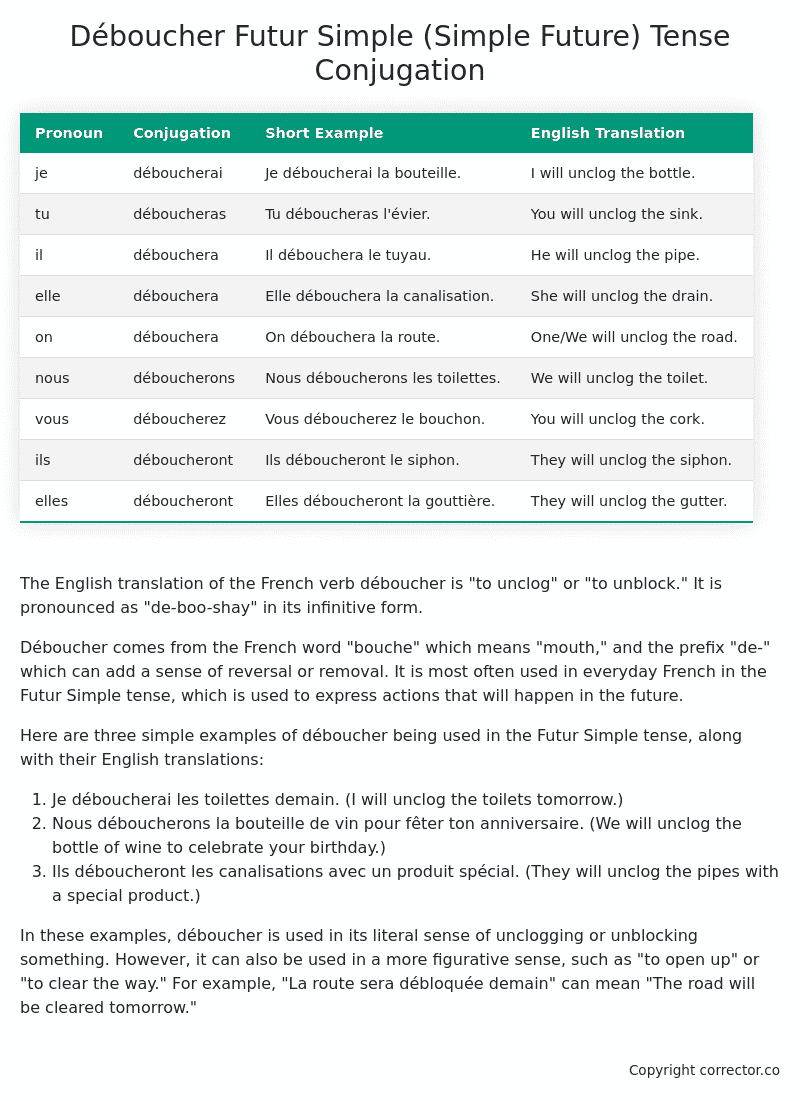Futur Simple (Simple Future) Tense Conjugation of the French Verb déboucher
Introduction to the verb déboucher
The English translation of the French verb déboucher is “to unclog” or “to unblock.” It is pronounced as “de-boo-shay” in its infinitive form.
Déboucher comes from the French word “bouche” which means “mouth,” and the prefix “de-” which can add a sense of reversal or removal. It is most often used in everyday French in the Futur Simple tense, which is used to express actions that will happen in the future.
Here are three simple examples of déboucher being used in the Futur Simple tense, along with their English translations:
- Je déboucherai les toilettes demain. (I will unclog the toilets tomorrow.)
- Nous déboucherons la bouteille de vin pour fêter ton anniversaire. (We will unclog the bottle of wine to celebrate your birthday.)
- Ils déboucheront les canalisations avec un produit spécial. (They will unclog the pipes with a special product.)
In these examples, déboucher is used in its literal sense of unclogging or unblocking something. However, it can also be used in a more figurative sense, such as “to open up” or “to clear the way.” For example, “La route sera débloquée demain” can mean “The road will be cleared tomorrow.”
Table of the Futur Simple (Simple Future) Tense Conjugation of déboucher
| Pronoun | Conjugation | Short Example | English Translation |
|---|---|---|---|
| je | déboucherai | Je déboucherai la bouteille. | I will unclog the bottle. |
| tu | déboucheras | Tu déboucheras l’évier. | You will unclog the sink. |
| il | débouchera | Il débouchera le tuyau. | He will unclog the pipe. |
| elle | débouchera | Elle débouchera la canalisation. | She will unclog the drain. |
| on | débouchera | On débouchera la route. | One/We will unclog the road. |
| nous | déboucherons | Nous déboucherons les toilettes. | We will unclog the toilet. |
| vous | déboucherez | Vous déboucherez le bouchon. | You will unclog the cork. |
| ils | déboucheront | Ils déboucheront le siphon. | They will unclog the siphon. |
| elles | déboucheront | Elles déboucheront la gouttière. | They will unclog the gutter. |
Other Conjugations for Déboucher.
Le Present (Present Tense) Conjugation of the French Verb déboucher
Imparfait (Imperfect) Tense Conjugation of the French Verb déboucher
Passé Simple (Simple Past) Tense Conjugation of the French Verb déboucher
Passé Composé (Present Perfect) Tense Conjugation of the French Verb déboucher
Futur Simple (Simple Future) Tense Conjugation of the French Verb déboucher (this article)
Futur Proche (Near Future) Tense Conjugation of the French Verb déboucher
Plus-que-parfait (Pluperfect) Tense Conjugation of the French Verb déboucher
Passé Antérieur (Past Anterior) Tense Conjugation of the French Verb déboucher
Futur Antérieur (Future Anterior) Tense Conjugation of the French Verb déboucher
Subjonctif Présent (Subjunctive Present) Tense Conjugation of the French Verb déboucher
Subjonctif Passé (Subjunctive Past) Tense Conjugation of the French Verb déboucher
Subjonctif Imparfait (Subjunctive Imperfect) Tense Conjugation of the French Verb déboucher
Subjonctif Plus-que-parfait (Subjunctive Pluperfect) Tense Conjugation of the French Verb déboucher
Conditionnel Présent (Conditional Present) Tense Conjugation of the French Verb déboucher
Conditionnel Passé (Conditional Past) Tense Conjugation of the French Verb déboucher
L’impératif Présent (Imperative Present) Tense Conjugation of the French Verb déboucher
L’infinitif Présent (Infinitive Present) Tense Conjugation of the French Verb déboucher
Struggling with French verbs or the language in general? Why not use our free French Grammar Checker – no registration required!
Get a FREE Download Study Sheet of this Conjugation 🔥
Simply right click the image below, click “save image” and get your free reference for the déboucher Futur Simple tense conjugation!

Déboucher – About the French Futur Simple (Simple Future) Tense
Formation of Futur Simple
For regular -er verbs (e.g., parler – to speak)
For regular -ir verbs (e.g., finir – to finish)
For regular -re verbs (e.g., vendre – to sell)
Common Everyday Usage Patterns
Conditional Statements
Interactions with Other Tenses
Futur Antérieur
Conditional
Present
Summary
I hope you enjoyed this article on the verb déboucher. Still in a learning mood? Check out another TOTALLY random French verb conjugation!


